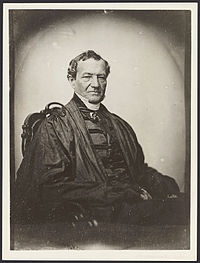Simon Greenleaf on the Rules of Evidence and the Christian Religion
October 6, 2016 Leave a comment
Simon Greenleaf died on this date, October 6, in 1853. He was an American jurist who wrote an influential three-volume Treatise on the Law of Evidence.
Greenleaf believed that lawyers have a responsibility to evaluate the evidences of the Christian religion using the standards of evidence demanded in their professional lives. Accordingly, Greenleaf detailed the results of his own investigation in an 1846 work titled An Examination of the Testimony of the Four Evangelists, by the Rules of Evidence Administered in Courts of Justice. With an Account of the Trial of Jesus.
 First, he set forth the following basic principles for governing any responsible investigation:
First, he set forth the following basic principles for governing any responsible investigation:
In examining the evidences of the Christian religion, it is essential to the discovery of truth that we bring to the investigation a mind freed, as far as possible, from existing prejudice and open to conviction. There should be a readiness, on our part, to investigate with candor, to follow the truth wherever it may lead us, and to submit, without reserve or objection, to all the teachings of this religion, if it be found to be of divine origin. (p. 21)
Here, in brief, is the conclusion Greenleaf reached regarding the testimony of the gospel writers concerning the resurrection of Jesus:
The great truths which the apostles declared, were, that Christ had risen from the dead, and that only through repentance from sin, and faith in him, could men hope for salvation. This doctrine they asserted with one voice everywhere, not only under the greatest discouragements, but in the face of the most appalling terrors that can be presented to the mind of man. Their master had recently perished as a malefactor, by the sentence of a public tribunal. His religion sought to overthrow the religions of the whole world. The laws of every country were against the teachings of his disciples. The interests and passion of all the rulers and great men in the world were against them. The fashion of the world was against them. Propagating this new faith, even in the most inoffensive and peaceful manner, they could expect nothing but contempt, opposition, revilings, bitter persecutions, stripes, imprisonments, torments and cruel deaths. Yet this faith they zealously did propagate; and all these miseries they endured undismayed, nay, rejoicing. As one after another was put to a miserable death, the survivors only prosecuted their work with increased vigor and resolution. . . . They had every possible motive to review carefully the grounds of their faith, and the evidences of the great facts and truths which they asserted; and these motives were pressed upon their attention with the most melancholy and terrific frequency. It was therefore impossible that they could have persisted in affirming the truths they have narrated, had not Jesus actually risen from the dead, and had they not known this fact as certain as they knew any other fact. (p. 53; italics added)
Suppose it were possible that Jesus’ disciples could have persisted in their public claims concerning Jesus and his resurrection even if Jesus had not risen. What seems most unlikely is that they would have persisted in this if they did not believe with grave conviction that Jesus had indeed risen. And this fact of their belief surely demands some plausible explanation, given their readiness to endure such persecution.
Greenleaf’s book still makes for stimulating reading. Its arguments deserve the attention of sincere inquirers today.
An Examination of the Testimony of the Four Evangelists is in the public domain. It can be read online here.



Recent Comments